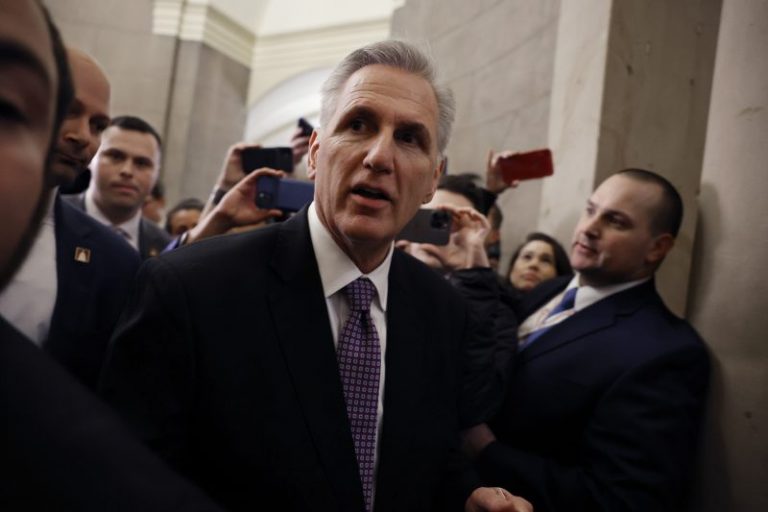In theory, the fight over the House of Representatives’ top leadership position is an internal one, 434 representatives casting votes in support of their preferred pick.
But, of course, this is the United States in 2023, and this is a fight that’s centered within the chamber’s Republican majority. And, therefore, the fight immediately spilled out into the broader conservative universe, with a wide range of Republican and right-wing voices weighing in to support their own preferences. Members of Congress, meanwhile — those in support of the bid by the leading Republican in the previous Congress, Kevin McCarthy (Calif.), and those blocking his ascent to the speakership — have informed all available microphones of their views of the situation.
The result is a fight too messy to articulate easily. But that will not prevent us from trying.
An important note at the start: This diagram is necessarily incomplete.
Okay. So, where to start?
With McCarthy, certainly, who has retained the support of more than 200 of his Republican colleagues — The Loyalists — over the course of six consecutive votes to elect a speaker. His primary opponents include Republicans Matt Gaetz (Fla.) and Lauren Boebert (Colo.), two legislators far better known for their presence on television and social media than for hammering out policy details.
Gaetz and Boebert have been joined by more than a dozen other House Republicans, including Chip Roy (Tex.), Bob Good (Va.) and Byron Donalds (Fla.).
Donalds at first supported McCarthy, but on Wednesday, he became the preferred candidate of The Rebels in his own right.
Normally, we’d expect to include Republican Marjorie Taylor Greene (Ga.) among the rebelling group; her alliance with Gaetz and others on the far-right edge of the conference is well established. But McCarthy’s pointed efforts to win Greene’s loyalty has paid off in this moment, with Greene supporting his bid. It’s essentially the same approach McCarthy took with former president Donald Trump, who has also been consistent in his support of McCarthy. The problem for the would-be speaker is that neither Greene nor Trump directs the rebel caucus in the way that might have been expected.
Just within this sphere, there’s been enormous infighting. Greene has attacked Boebert; Boebert has attacked Greene. Gaetz has disparaged Trump, calling the former president’s support for McCarthy “sad” in an echo of one of Trump’s own favorite words. But, again, the fighting isn’t contained to this sphere.
Other elected officials, most notable the Republicans Dan Crenshaw (Tex.) and Nancy Mace (S.C.), have gone after the rebels. Crenshaw called Good a “dud” and a “loser” while describing the rest of the anti-McCarthy holdouts as “terrorists.” Mace has been relentless in attacking Gaetz, calling him, among other things, a “fraud.”
And then there’s the media world. The Fox News-iverse is split, with Sean Hannity — in keeping with his long-standing allegiance to Trump — siding with McCarthy. On Wednesday night, Hannity hosted Boebert for a surprisingly hostile interview aimed at undercutting the anti-McCarthy arguments.
A lot of the interview was somewhat like this pic.twitter.com/UEUaX76806
— Acyn (@Acyn) January 5, 2023
The network’s Tucker Carlson, however, has been critical of McCarthy for two nights in a row. On Tuesday, he disparaged the Republican as being “ideologically agnostic,” a politician whose “real constituency is the lobbying community.” On Wednesday, he mocked McCarthy more personally.
The crew at “Fox & Friends,” though, is Team McCarthy. Co-host Brian Kilmeade went after the rebels Thursday morning, suggesting, for example, that Boebert and Gaetz had unclear aims and uncertain loyalties.
Most other conservative and right-wing voices are offering the same assessments. Ben Shapiro has criticized the fight as unnecessarily damaging, given that the job of a Republican speaker is nothing more than to say “no.” Former House speaker Newt Gingrich has made multiple media appearances to offer similar criticisms. Most of the voices in right-wing media that are siding with the rebels sit closer to the fringe, although former Fox Business host Lou Dobbs did express his support for “end[ing] RINO rule” in the House. (Dobbs was ousted from the network after he promoted Trump’s false claims about election fraud.)
If you’re a prominent voice on the right, it seems, you’re expected to weigh in on the fight. So, on Thursday morning, Twitter owner Elon Musk did so, expressing support for the California Republican’s bid.
Again, this is an incomplete list. Fox News host Laura Ingraham has largely stayed out of it, although she’s been skeptical of the effort to block McCarthy. Energetic radio host Mark Levin is team McCarthy, often expressing his view as being team anti-Gaetz. Turning Point USA’s Charlie Kirk is rebel-sympathetic, at least, using the moment to demonstrate his own fealty to the former president.
As of Thursday morning, the resolution of this tension is unclear. So, too, is the extent to which the rifts that have emerged will eventually be healed.
But it is clear why Democrats are enjoying this week far more than are their political opponents.
Aaron Blake contributed to this report.

